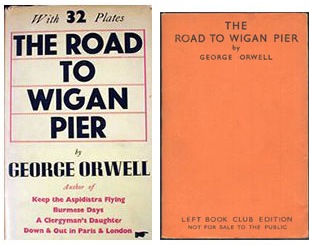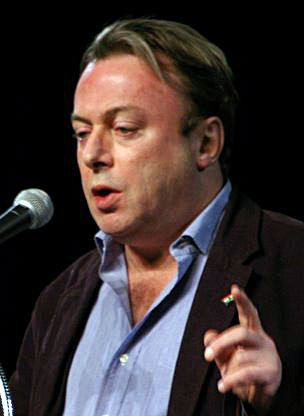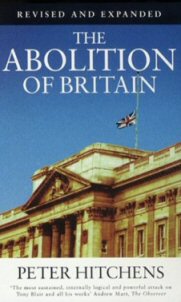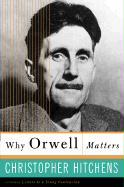
Animal Farm is a beast fable, in the form of a satirical allegorical novella, by George Orwell, first published in England on 17 August 1945. It tells the story of a group of anthropomorphic farm animals who rebel against their human farmer, hoping to create a society where the animals can be equal, free, and happy. Ultimately, the rebellion is betrayed and, under the dictatorship of a pig named Napoleon, the farm ends up in a state as bad as it was before.

Eric Arthur Blair was an English novelist, poet, essayist, journalist, and critic who wrote under the pen name of George Orwell. His work is characterised by lucid prose, social criticism, opposition to totalitarianism, and support of democratic socialism.

Homage to Catalonia is George Orwell's personal account of his experiences and observations fighting in the Spanish Civil War for the POUM militia of the Republican army.

The Road to Wigan Pier is a book by the English writer George Orwell, first published in 1937. The first half of this work documents his sociological investigations of the bleak living conditions among the working class in Lancashire and Yorkshire in the industrial north of England before World War II. The second half is a long essay on his middle-class upbringing, and the development of his political conscience, questioning British attitudes towards socialism. Orwell states plainly that he himself is in favour of socialism, but feels it necessary to point out reasons why many people who would benefit from socialism, and should logically support it, are in practice likely to be strong opponents.

Christopher Eric Hitchens was a British author, journalist and educator. Author of 18 books on faith, culture, politics and literature, he was born and educated in Britain, graduating in the 1970s from Oxford with a degree in Philosophy, Politics and Economics. In the early 1980s, he emigrated to the United States and wrote for The Nation and Vanity Fair. Known as "one of the 'four horsemen'" of New Atheism, he gained prominence as a columnist and speaker. His epistemological razor, which states that "what can be asserted without evidence can also be dismissed without evidence", is still of mark in philosophy and law.

A Clergyman's Daughter is a 1935 novel by English author George Orwell. It tells the story of Dorothy Hare, the titular clergyman's daughter, whose life is turned upside down when she suffers an attack of amnesia. It is Orwell's most formally experimental novel, featuring a chapter written entirely in dramatic form, but he was never satisfied with it and he left instructions that after his death it was not to be reprinted. Despite these instructions, Orwell did consent to the printing of cheap editions "of any book which may bring in a few pounds for my heirs" following his death.

Peter Jonathan Hitchens is an English conservative author, broadcaster, journalist, and commentator. He writes for The Mail on Sunday and was a foreign correspondent reporting from both Moscow and Washington, D.C. Peter Hitchens has contributed to The Spectator, The American Conservative, The Guardian, First Things, Prospect, and the New Statesman. His books include The Abolition of Britain, The Rage Against God, The War We Never Fought and The Phoney Victory.
The Theory and Practice of Oligarchical Collectivism is a fictional book in George Orwell's dystopian novel Nineteen Eighty-Four. The fictional book was supposedly written by Emmanuel Goldstein, the principal enemy of the state of Oceania's ruling party. The Party portrays Goldstein as a former member of the Inner Party who continually conspired to depose Big Brother and overthrow the government. In the novel, the fictional Goldstein's book is read by the protagonist, Winston Smith, after a supposed friend, O'Brien, provided one copy to him. Winston had recalled that "There were ... whispered stories of a terrible book, a compendium of all the heresies, of which Goldstein was the author, and which circulated clandestinely here and there. It was a book without a title. People referred to it, if at all, simply as The Book."

The Information Research Department (IRD) was a secret Cold War propaganda department of the British Foreign Office, created to publish anti-communist propaganda, including black propaganda, provide support and information to anti-communist politicians, academics, and writers, and to use weaponised information, but also disinformation and "fake news", to attack not only its original targets but also certain socialists and anti-colonial movements. Soon after its creation, the IRD broke away from focusing solely on Soviet matters and began to publish pro-colonial propaganda intended to suppress pro-independence revolutions in Asia, Africa, Ireland, and the Middle East. The IRD was heavily involved in the publishing of books, newspapers, leaflets and journals, and even created publishing houses to act as propaganda fronts, such as Ampersand Limited. Operating for 29 years, the IRD is known as the longest-running covert government propaganda department in British history, the largest branch of the Foreign Office, and the first major anglophone propaganda offensive against the USSR since the end of World War II. By the 1970s, the IRD was performing military intelligence tasks for the British Military in Northern Ireland during The Troubles.

The Abolition of Britain: From Lady Chatterley to Tony Blair is the first book by British conservative journalist Peter Hitchens, published in 1999. It examines a period of perceived moral and cultural reform between the 1960s and New Labour's 1997 general election win. Hitchens asserts that the reforms facilitated vast and radical constitutional change under Tony Blair's new government that amounted to a "slow motion coup d'état". The book was cited by Gillian Bowditch in The Times as being a major modern work to dissect "the decline in British morals and manners over the past 50 years", and identified by Andrew Marr in The Observer as "the most sustained, internally logical and powerful attack on Tony Blair and all his works".
The "managerial state" is a concept used in critiquing modern procedural democracy. The concept is used largely, though not exclusively, in paleolibertarian, paleoconservative, and anarcho-capitalist critiques of late modern state power in Western democracies. Theorists Samuel T. Francis and Paul Gottfried, developing ideas inspired by the analytical framework of James Burnham, say this is an ongoing regime that remains in power, regardless of what political party holds a majority.

God Is Not Great is a 2007 book by British-American author and journalist Christopher Hitchens in which he makes a case against organized religion. It was originally published in the United Kingdom by Atlantic Books as God Is Not Great: The Case Against Religion and in the United States by Twelve as God Is Not Great: How Religion Poisons Everything, but was republished by Atlantic Books in 2017 with no subtitle.

In George Orwell's 1949 dystopian novel Nineteen Eighty-Four, the world is divided into three superstates: Oceania, Eurasia and Eastasia, who are all fighting each other in a perpetual war in a disputed area mostly located around the equator. All that Oceania's citizens know about the world is whatever the Party wants them to know, so how the world evolved into the three states is unknown; and it is also unknown to the reader whether they actually exist in the novel's reality, or whether they are a storyline invented by the Party to advance social control. The nations appear to have emerged from nuclear warfare and civil dissolution over 20 years between 1945 and 1965, in a post-war world where totalitarianism becomes the predominant form of ideology, through Neo-Bolshevism, English Socialism, and Obliteration of the Self.
'Notes on Nationalism' is an essay completed in May 1945 by George Orwell and published in the first issue of the British magazine Polemic in October 1945. Political theorist Gregory Claeys has described it as a key source for understanding Orwell's novel Nineteen Eighty-Four.
"Second Thoughts on James Burnham" is an essay, first published in May 1946 in Polemic, by the English author George Orwell. The essay discusses works written by James Burnham, an American political theorist.

The bibliography of George Orwell includes journalism, essays, novels, and non-fiction books written by the British writer Eric Blair (1903–1950), either under his own name or, more usually, under his pen name George Orwell. Orwell was a prolific writer on topics related to contemporary English society and literary criticism, who has been declared "perhaps the 20th century's best chronicler of English culture." His non-fiction cultural and political criticism constitutes the majority of his work, but Orwell also wrote in several genres of fictional literature.

Christopher Hitchens was a British-American author, polemicist, debater and journalist who in his youth took part in demonstrations against the Vietnam War, joined organisations such as the International Socialists while at university and began to identify as a socialist. However, after 9/11 he no longer regarded himself as a socialist and his political thinking became largely dominated by the issue of defending civilization from terrorists and against the totalitarian regimes that protect them. Hitchens nonetheless continued to identify as a Marxist, endorsing the materialist conception of history, but believed that Karl Marx had underestimated the revolutionary nature of capitalism. He sympathized with libertarian ideals of limited state interference, but considered libertarianism not to be a viable system. In the 2000 U.S. presidential election, he supported the Green Party candidate Ralph Nader. After 9/11, Hitchens advocated the invasion of Iraq. In the 2004 election, he very slightly favored the incumbent Republican President George W. Bush or was neutral and in 2008 he favored the Democratic candidate Barack Obama over John McCain despite being critical of both of them.

Nineteen Eighty-Four is a dystopian novel and cautionary tale by English writer George Orwell. It was published on 8 June 1949 by Secker & Warburg as Orwell's ninth and final book completed in his lifetime. Thematically, it centres on the consequences of totalitarianism, mass surveillance, and repressive regimentation of people and behaviours within society. Orwell, a democratic socialist, modelled the authoritarian state in the novel on the Soviet Union in the era of Stalinism and Nazi Germany. More broadly, the novel examines the role of truth and facts within societies and the ways in which they can be manipulated.

"Reflections on Gandhi" is an essay by George Orwell, first published in 1949, which responds to Mahatma Gandhi's autobiography The Story of My Experiments with Truth. The essay, which appeared in the American magazine Partisan Review, discusses the autobiography and offers both praise and criticism to Gandhi, focusing in particular on the effectiveness of Gandhian nonviolence and the tension between Gandhi's spiritual worldview and his political activities. One of a number of essays written by Orwell and published between Animal Farm (1945) and Nineteen Eighty-Four (1949), "Reflections on Gandhi" was the last of Orwell's essays to be published in his lifetime and was not republished until after his death.
Toward European Unity was a 1947 essay by George Orwell on the subject of European integration. In the essay, Orwell speculated about possible futures in which the world could fall to nuclear war or totalitarianism. He proposed the creation of a democratic socialist European Union as an alternative to such scenarios, although he also predicted that it would have to ovecome opposition by imperial powers.












